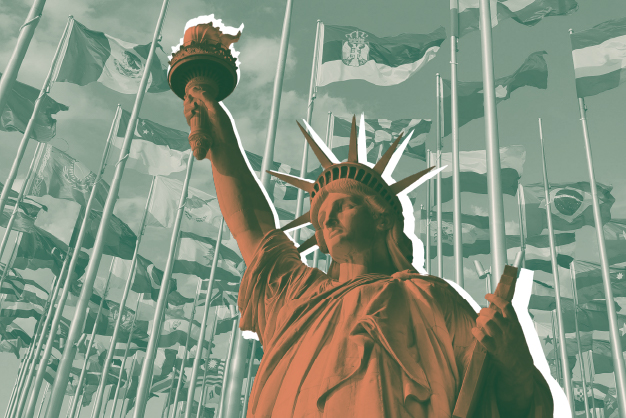California is home to over 11 million immigrants—each a valued human being who helps build the future of our state. Nearly half of all Californian children have at least one immigrant parent, yet another reflection of our state’s deep and unmatched immigrant roots. This is a legacy to be proud of: no other state carries such a rich, living history of migration, resilience, and community strength.
At UDW, we know that immigrant justice is labor justice. Our union’s power comes from unity—across race, language, origin, and experience. The immigrant struggle is our shared struggle. Every effort to win safety, belonging, and justice is a fight for the future of all workers.
We reject every attempt to divide us: by immigration status, by race, by sexual orientation or gender expression, by the lines others draw to keep us apart. That attempt to divide-and-conquer is the oldest anti-worker tactic in the book, designed to silence us and stop us from building collective strength.
Every UDW member deserves dignity, respect, and equal protection under the law. We don’t just see and respect immigrants—we organize with them, we protect them, and we ARE them. A just future demands that we rise together.
When We Talk About Care Work, We Must Talk About Immigrants
The structure of domestic work in the U.S. was built on the work of enslaved Black women and continued through the lives of free Black women in the post-Civil War South. Nearly 90% of Black women workers at the time were employed as domestic servants, locked out of other opportunities by systemic racism. But the injustice didn’t stop at the Mason-Dixon Line.
Across the country, domestic labor has long been filled by women of color—Black women, Indigenous women, Latinas, Filipinas, Chinese, Vietnamese and other immigrant women—whose work was essential but whose rights were ignored. In California, the care economy was built on the labor of Mexican, Filipina and Vietnamese women recruited during labor shortages, only to be paid less and excluded from workplace protections.
This racial, gendered pattern was no accident. Domestic and agricultural workers—many of them Black and brown women—were deliberately excluded from the New Deal’s labor protections to appease Southern lawmakers, setting the stage for generations of inequality.
Today’s care providers, many of us immigrants and people of color, inherit that legacy of exclusion. And yet, as UDW members, we continue to show up with strength and skill, anchoring our communities and our economy with care.
We Are a Union United, No Exceptions
Some may say that immigration isn’t a union or UDW issue, but we say: you can’t build worker power while ignoring the lives and rights of the workers themselves.
If you believe in basic human dignity, if you believe in fair pay, in safety, in respect—you believe in the fight for immigrant justice and our shared union values.
UDW is a union of care workers which also means we are a union of immigrants. No matter where you’re from, you belong here with us. If that makes some uncomfortable, good. Solidarity should stretch us and we won’t back down from doing what’s right. We won’t back down from protecting the humanity that exists within all of us.
Immigrant justice is labor justice. When one of us is targeted, all of us are threatened. That’s why UDW continues to push for policies that protect all workers, including access to health care, fair wages, and a path to citizenship.
Take Action and Stand in Solidarity
This fight belongs to all of us. Immigrant justice is worker justice—and that means it’s union business. If you care about dignity, fair treatment, and the right to build a life, then you’re already part of this movement.
Take action:
- Know your rights and help others learn theirs
- Share your story because your voice makes us stronger
- Get involved with UDW’s immigrant justice work. Contact your local office to see how you can get involved.
We will not let fear divide us. We will continue to organize, uplift, and protect one another because no human is illegal and our care knows no borders.
